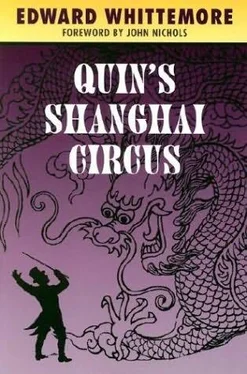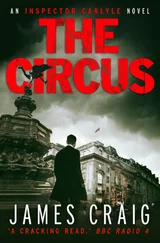Edward Whittemore - Quin’s Shanghai Circus
Здесь есть возможность читать онлайн «Edward Whittemore - Quin’s Shanghai Circus» весь текст электронной книги совершенно бесплатно (целиком полную версию без сокращений). В некоторых случаях можно слушать аудио, скачать через торрент в формате fb2 и присутствует краткое содержание. Жанр: Фэнтези, на английском языке. Описание произведения, (предисловие) а так же отзывы посетителей доступны на портале библиотеки ЛибКат.
- Название:Quin’s Shanghai Circus
- Автор:
- Жанр:
- Год:неизвестен
- ISBN:нет данных
- Рейтинг книги:3 / 5. Голосов: 1
-
Избранное:Добавить в избранное
- Отзывы:
-
Ваша оценка:
- 60
- 1
- 2
- 3
- 4
- 5
Quin’s Shanghai Circus: краткое содержание, описание и аннотация
Предлагаем к чтению аннотацию, описание, краткое содержание или предисловие (зависит от того, что написал сам автор книги «Quin’s Shanghai Circus»). Если вы не нашли необходимую информацию о книге — напишите в комментариях, мы постараемся отыскать её.
Quin’s Shanghai Circus — читать онлайн бесплатно полную книгу (весь текст) целиком
Ниже представлен текст книги, разбитый по страницам. Система сохранения места последней прочитанной страницы, позволяет с удобством читать онлайн бесплатно книгу «Quin’s Shanghai Circus», без необходимости каждый раз заново искать на чём Вы остановились. Поставьте закладку, и сможете в любой момент перейти на страницу, на которой закончили чтение.
Интервал:
Закладка:
After descending another three or four hundred feet they entered a circular room where a dozen men or more sat at a counter facing the wall, or rather small windows recessed in the wall. Their backs were to him and no one turned when he came in. The waiter directed him to an empty stool, sucked air, and disappeared.
A face peered up at him from the bartenders’ runway, which was sunken so the heads of the bartenders would not protrude above the counter. Quin ordered a drink and saw a hand come up over the edge with a glass.
On the counter in front of him there was a console of buttons. Family portrait , said one. Small projection lamp , said another. Tattoos. Kobe cameras . Quin arbitrarily pressed the button for Nose .
The screen that Quin had mistaken for a mirror flickered. The screens were built in such a way that only the man directly in front of one could see which private movie he had selected. To everyone else the screens remained mirrors reflecting a distorted view of the small round room.
The first nose was flat and spreading. It grew in size until the screen could no longer contain it. The pores, rich dark holes, were soon big enough to put a fist in, as big as craters in a desert. The rims of the craters were cracked, deep down inside lay heaps of fertile material. The picture continued to expand until there was only one enormous pore on the screen, a volcanic crater not unlike the one to be found on top of Mt. Fuji, the sides of the pore cut by ancient landslides, the center black with dormant bacterial lava.
The frame faded and another nose appeared, life-size, narrower than the first, quivering, and undeniably sensitive. A chrysanthemum or a cherry blossom presented itself to the nose. The nose hesitated and then inhaled deeply, bringing on a multitude of tender sensations.
The third nose moved rapidly. The hairs in the nostrils flapped as a bowl of custard slipped into view. The nose slammed itself into the custard, emerged, rammed itself into the waxy cartilage of an ear.
The same nose moved down a neck, across an armpit, through the crevice made by two pendulant breasts. It nudged a woman’s erect nipples, poked the ridges of her rib cage, shook itself vigorously in her navel, pecked at the mound of her smooth belly. It caressed the thighs and burrowed between the toes, sampling, working swiftly.
Quin’s head jerked back. For an instant a totally different image had appeared on the screen, or so it seemed. A scene from what looked like a barnyard, healthy animals being cared for by healthy, smiling peasants wearing starched muslin and embroidered blouses, East Europeans of some kind, Slavs perhaps, cheerfully tending their animals under the benign guidance, the approving fatherly gaze of a dashing man with a moustache and a worker’s cap, dressed in a loosely fitted black suit and a high celluloid collar.
Lenin?
The image was gone at once and not so much seen as imagined, an effect that made the tale of the nose curiously disturbing. Somehow the suggestion of an actual historical event added authenticity to a film that might otherwise have been merely obsessive and unreal.
The nose lay on its back as a woman’s legs opened at the top of the screen. The legs descended, spread wide, bringing down a curtain of wiry hair that ended the film.
Quin’s glass was empty. Even the ice was gone. A legend beside the buttons on the counter noted that all the films were changed every third day. It also invited the guest to indulge himself in combinations by pressing several or all of the buttons at once, thereby creating unique themes previously unwitnessed. Quin was about to order another drink when the waiter reappeared, apologizing as before, and invited him to pay a visit to Madame Mama.
Once more they walked down a spiral staircase, but this one was narrow and plain and neither carpeted nor lit by chandeliers. It wound down between weathered boards that formed a square shaft, reinforced at every level by what appeared to be a roof. In fact, Quin wondered if they were descending through a pagoda that had been built under the ground instead of above, narrowing into the earth instead of the sky.
She sat at the bottom of the well in a bare wooden room, a tiny white-haired woman in black kimono, her only decoration an oval emerald resting on her forehead. She inclined her head as she greeted him, a kindly, aristocratic woman who spoke precise English with a slightly archaic accent.
The sages like to remind us, she said, that the only life we know here is as one underground, that we must pass through many incarnations before we finally see the sun. A pagoda can also have three or five stories, but mine has seven. Is Father Lamereaux still alive?
Yes he is, answered Quin.
How strange. I always thought he died during the war.
No, but it seems he’s been pretty much of a recluse since then.
I see. Well he was very kind to me once and we must never forget a kindness. What may I do for you, Mr. Quin?
Father Lamereaux thought you might have known my father in Shanghai. He thought you might have been there when he died.
And when was that?
About 1937 I think.
Mama’s face showed no expression.
I was there about then, she said, and I did know many foreigners, many of whom died, most of them in the end. But they were all nameless to me. We didn’t use names then. Ever,
And you’ve never heard of someone called Quin?
Mama frowned. She unfolded her hands, paused, refolded them in a different way.
Yes, I believe I have. But it wasn’t in Shanghai, it was in Tokyo. It was in connection with something that had happened in Shanghai eight years before I lived there.
Mama spoke slowly. She talked of Japan before the war, of Shanghai and the desperation she had known there. She said that to recall the events of that lurid era would be to play an uneasy, painful game with the past. She talked for over an hour and asked him to come to see her again. Meanwhile she offered him the use of an interpreter to help him find the other person Father Lamereaux had mentioned.
Quin left feeling oddly close to the ancient little woman even though she had not discussed the circumstances in which she had heard his father’s name. Instead she had talked at length about herself. Why had she avoided his questions?
Quin thought he knew the answer. Geraty had said the espionage ring operated for eight years. If his father had died in Shanghai when Mama was there, then the event she had alluded to, the episode that occurred eight years before that time, might be connected with the beginning of the ring. Mama had said it would be an uneasy, painful game of memory to recall that era and Quin believed her, for the uneasy, painful game could have only one name.
Shanghai.
The interpreter, a meek elderly man, suggested they begin their search at once in Tsukiji, the area of Tokyo where Quin had been told to look for the gangster Kikuchi-Lotmann. Since it was the fish market district, Tsukiji had the best sushi restaurants in the city. The interpreter led Quin to one on a main street and indicated a table by the window.
If we sit there, he said, we should be able to get our bearings. Shall we?
The interpreter spoke to the waiter and plates of sushi began to appear, those for Quin heavy on the cheaper cuts of octopus and squid, those for the interpreter tending toward expensive sea urchin and expensive salmon roe and an extremely expensive northern whitefish that was so rare it was seldom available at any price.
Quin drank beer. The interpreter drank a premium iced sake from a brewery in Hiroshima that bottled the special brand only once a year on the Emperor’s birthday.
Quin finished his beer waiting to hear the interpreter’s plan for finding Kikuchi-Lotmann. The man said nothing, instead he ordered a second plate of sushi and a third. Quin found himself paying the bill, which was exorbitantly high, while the interpreter exchanged pleasantries with the man at the cash register. Once outside, the interpreter walked a few steps to a doorway and stopped.
Читать дальшеИнтервал:
Закладка:
Похожие книги на «Quin’s Shanghai Circus»
Представляем Вашему вниманию похожие книги на «Quin’s Shanghai Circus» списком для выбора. Мы отобрали схожую по названию и смыслу литературу в надежде предоставить читателям больше вариантов отыскать новые, интересные, ещё непрочитанные произведения.
Обсуждение, отзывы о книге «Quin’s Shanghai Circus» и просто собственные мнения читателей. Оставьте ваши комментарии, напишите, что Вы думаете о произведении, его смысле или главных героях. Укажите что конкретно понравилось, а что нет, и почему Вы так считаете.












